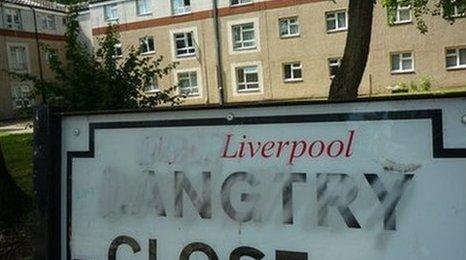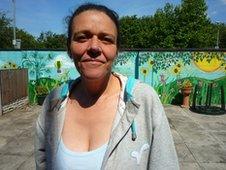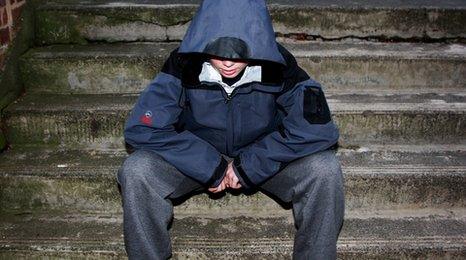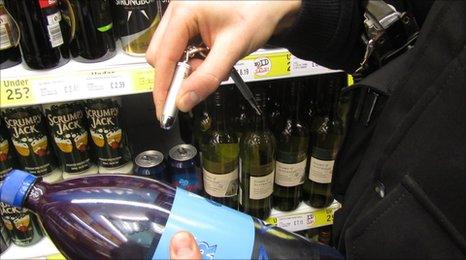Contracts 'cut' anti-social behaviour on housing estate
- Published

Police in Liverpool say a new method of asking neighbours to report anti-social behaviour has made a "genuine" difference to problems on one estate.
Residents on the Westminster estate in the north of the city are asked to fill in diaries.
They detail problems like nuisance neighbours or rowdy gangs.
Superintendent Simon Irving from Merseyside Police says the community has "taken ownership" of anti-social behaviour.
"We have seen a diminishing crime rate and diminishing reports of anti-social behaviour," he says.
There are around 400 homes on the Westminster estate, an area that was known in the past for having its problems.
Lindsay Baines, 24, has lived there for three years and says it was very different when she first moved in.
"It used to be horrible. It used to be full of all smack heads and that round here," she says as she walks out of a job club provided by the tenants' association.
Unique community
In 2008 the council-owned properties were sold to a not-for-profit social landlord, Liverpool Mutual Homes.

Lindsay Baines says things have changed since the contracts came in
Tenants were included on the management team running the organisation and they decided to attempt a crackdown on crime and anti-social behaviour.
They made all new residents sign a "neighbourhood agreement" in which they promised to behave properly and control their pets.
Residents who broke the agreement could then be evicted.
At the same time, people living on the estate were handed incident diaries in which they could report problems to the landlord or the police.
The police say the diaries - which are used elsewhere in targeted cases - have been used in a "unique" way on the estate.
"The vast majority of residents there fill in these sheets," says Superintendent Simon Irving.
"What they are is what we would call 'low level community intelligence'."
'Family' neighbours
On a hot, humid day local resident Anna-Marie Davis arrives at the tenants' association, where she's got to know people so well she now calls them her "family".

Anna-Marie Davis says the tenants group helped with an abusive partner
She says the community support on the estate has allowed her to "turn her life around" after a violent experience living here.
"I met someone," she explains. "But he turned bad. He become an alcoholic.
"He beat me up, a couple of times."
On another occasion her partner became violent again and smashed Anna-Marie's flat "to smithereens" using a hammer.
Anna-Marie says she was able to rely on action from the tenants group and the landlord.
Her partner was interviewed by the police and she says he was told not to return to the estate.
Future concern
Earlier this year the Westminster estate was visited by Baroness Newlove, the government's champion for safer communities.
Her husband Gary was beaten to death when he confronted a gang outside his home in Warrington in 2007.
She promoted the Westminster estate as a model of community action saying it had delivered "real improvements".
But privately many people involved in the improvements here say they're concerned about the future.
Some of the changes to the policing operation, street improvements and activities for teenagers have involved public money, and most people here say the prospect of spending cuts could change their fortunes.
Elsewhere, not everyone is as supportive of the changes on the estate.
Half a mile east of here two teenagers sitting outside a local barbers' shop claim some people who live on Westminster are "grasses".
But for Anna-Marie Davis, it's been all about knowing her neighbours were looking out for her.
"They've helped me and helped me turned my life around. And here I am now, still here," she says.
- Published7 February 2011

- Published26 January 2011

- Published23 September 2010
